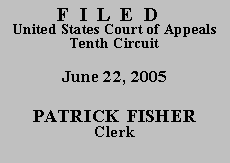 UNITED STATES COURT OF APPEALS
UNITED STATES COURT OF APPEALS
 UNITED STATES COURT OF APPEALS
UNITED STATES COURT OF APPEALS
| FREDERICK BILL YAZZIE,
Petitioner-Appellant, v. LANE BLAIR, Respondent-Appellee. |
|
Yazzie was convicted in New Mexico state court of two counts of criminal sexual penetration, aggravated residential burglary, aggravated battery, kidnapping, intimidation of a witness, and assault with intent to commit a violent felony. He was sentenced to thirty-nine years' imprisonment. In directly appealing his conviction, Yazzie assigned four claims of error, all of which were denied on the merits. He then filed a petition for writ of habeas corpus in state court, raising thirty-four grounds for relief; the state district court denied all claims as a matter of law, and the Supreme Court of New Mexico denied certiorari. Within the one-year limitation period, Yazzie filed a § 2254 petition repeating verbatim the thirty-four claims raised in his state petition. The magistrate judge grouped Yazzie's claims into eight categories: (1) ineffective assistance of trial counsel by Maria Rodriguez; (2) ineffective assistance of trial counsel by Bruce Fox; (3) ineffective assistance of trial counsel by Alan E. Whitehead; (4) ineffective assistance of appellate counsel by Will O'Connell; (5) prosecutorial misconduct; (6) judicial misconduct; (7) insufficient evidence to support Yazzie's conviction; and (8) imposition of an illegal sentence.
Under AEDPA, if a claim is adjudicated on the merits in state court, a federal court will grant habeas relief only if that adjudication resulted in a decision "that was contrary to, or involved an unreasonable application of, clearly established Federal law, as determined by the Supreme Court of the United States" or "was based on an unreasonable determination of the facts in light of the evidence presented in the State court proceeding." 28 U.S.C. § 2254(d)(1)(2). After thoroughly reviewing Yazzie's claims in light of this demanding standard in a 38-page recommended disposition, the magistrate judge recommended that Yazzie's petition be dismissed with prejudice and that his request for an evidentiary hearing be denied. Over Yazzie's objection, the district court adopted the magistrate judge's proposed findings and recommended disposition and dismissed Yazzie's petition. His request for a COA having been denied below, he now seeks a COA from this court, presenting the same arguments as he presented below.(1)
After careful review of Yazzie's application, the magistrate judge's proposed findings and recommended disposition, the district court's order denying relief, and the material portions of the record on appeal, we conclude that Yazzie's claims are without merit. Accordingly, Yazzie has failed to make "a substantial showing of the denial of a constitutional right." § 2253(c)(2). Because we determine, for substantially the same reasons as the district court, that the state court's resolution of these issues was a reasonable application of clearly established federal law, based on a reasonable determination of the facts in light of the evidence presented in the state court proceeding, Yazzie's application for a COA is DENIED and the appeal is DISMISSED.
ENTERED FOR THE COURT
Carlos F. Lucero
Circuit Judge
1. Yazzie's petition was filed after April 24, 1996, the effective date of the Antiterrorism and Effective Death Penalty Act ("AEDPA"); as a result, AEDPA's provisions apply to this case. See Rogers v. Gibson, 173 F.3d 1278, 1282 n.1 (10th Cir. 1999) (citing Lindh v. Murphy, 521 U.S. 320 (1997)). AEDPA conditions a petitioner's right to appeal a denial of habeas relief under § 2254 upon a grant of a COA. 28 U.S.C. § 2253(c)(1)(A). A COA may be issued "only if the applicant has made a substantial showing of the denial of a constitutional right." § 2253(c)(2). This requires Yazzie to show "that reasonable jurists could debate whether (or, for that matter, agree that) the petition should have been resolved in a different manner or that the issues presented were adequate to deserve encouragement to proceed further." Slack v. McDaniel, 529 U.S. 473, 484 (2000) (quotations omitted). Because the district court denied Yazzie a COA, he may not appeal the district court's decision absent a grant of COA by this court.